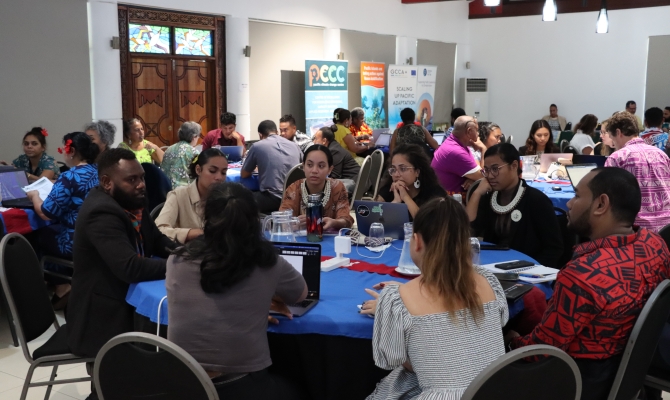Youth representatives from across the Pacific have had the opportunity to learn firsthand about the issue of loss and damage from experts and experienced climate change negotiators during the inaugural Pacific Small Island Developing States (SIDS) Loss and Damage Dialogue.
Hosted by the Secretariat of the Pacific Regional Environment Programme (SPREP) and Climate Analytics, the gathering brought together government and non-governmental organisations, civil society, academia, and the private sector for a three-day dialogue to discuss experiences with loss and damage in the Pacific and explore options to address the issue in the region.
Taveli Pavihi of Niue says that he is grateful for the opportunity to be included in the Loss and Damage dialogue as it is a fairly new topic for him.
“Prior to this meeting, I had done my own little research on loss and damage by looking up resources available on the United Nations Framework Convention on Climate Change website as well as the Alliance of Small Ocean States website,” Pavihi said.
“Being here and listening to the experts and experienced climate change negotiators, I have learned much more and have been able to expand my understanding of the issue.”
“One thing I can take away from this dialogue is that there is no actual definition for loss and damage. This is an advantage for Pacific SIDS as we can come up with our definition of loss and damage which we can then use in the development of the loss and damage fund,” he added.
From the Republic of the Marshall Islands, Jollia Peter says the dialogue has helped her see how much awareness is needed back in their home country on the issue of loss and damage.
“We are facing loss and damage back home but because there’s little understanding of it, we have not done all that we can to address it,” she says.
“I’ve already started the conversation with another youth representative back home who is part of 350 Pacific, sharing reflections on what I’ve been able to learn from this meeting, and I’m eager to go back and share this with the rest of our youth.”
The importance of including youth in dialogues about loss and damage was highlighted by SPREP’s Director of Climate Change Resilience, Tagaloa Cooper.
“The youth are an important part of our society, because they are young, passionate, and organised. SPREP recognises the importance of strengthening their capacity and involving them in these dialogues now as they are our future leaders,” Cooper says.
“We will not be around forever, and the youth will be carrying on this work when we are no longer here in whatever capacity they hold. If we start preparing them now, and they familiarise themselves with these issues, they will become a formidable part of it in the future.”
Cooper’s thoughts are echoed by Joe Sikulu of the Pacific Climate Warriors, who says, “Any frameworks that are set up now are going to have to be carried forward by our youth. They are also the ones who are going to be the most affected by the impacts of climate change, so getting them involved from the beginning and ensuring that their voices are part of those structures is key to ensuring their success.”
But there is much work to be done, according to Sikulu, to educate the youth on loss and damage so they can be involved in the conversations.
“It can be very hard and technical, but the reality is, our youth living in our Pacific islands are already facing the realities of loss and damage. We just have to make sure that we can connect the issue to what they are currently facing,” he said.
SOURCE: SPREP/PACNEWS













